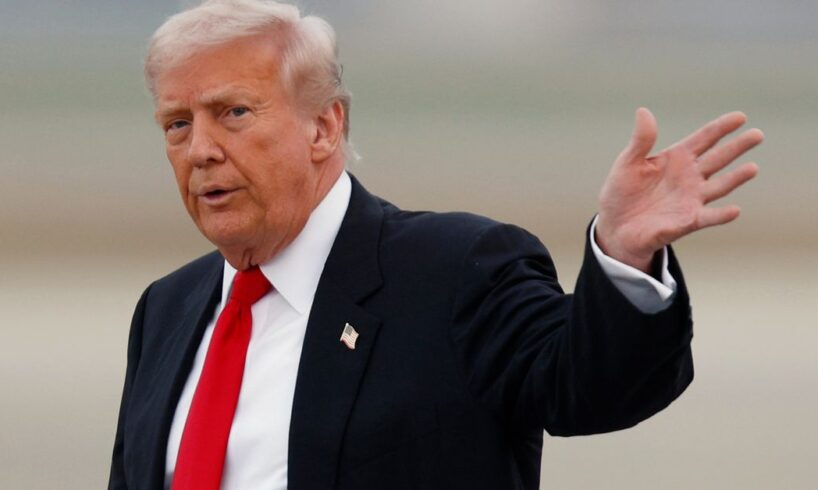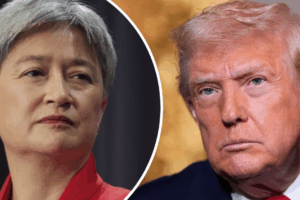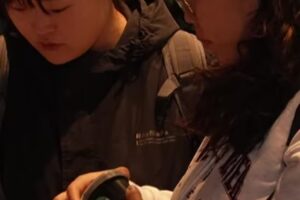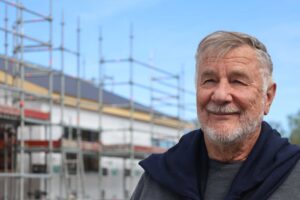
US President Donald Trump has reportedly sent a letter to the BBC threatening legal action over the way a speech he made was edited in a documentary aired by the British broadcaster.
The BBC is facing a leadership crisis and mounting political pressure after two of its most senior executives resigned on Sunday over accusations of bias in the Panorama documentary’s editing of a speech Trump made on January 6, 2021, before a crowd of his supporters stormed the Capitol in Washington.
The resignation of BBC director-general Tim Davie and news chief Deborah Turness over accusations of bias was welcomed by Trump on Sunday (Monday AEDT), who said the way his speech had been edited was an attempt to “step on the scales of a Presidential Election”.
President Donald Trump waves after speaking to the media upon his arrival at Joint Base Andrews, Md., Sunday, Nov. 9, 2025, after returning from his Mar-a-Lago estate in Palm Beach, Fla. and en route to an NFL football game between the Washington Commanders and the Detroit Lions. (AP Photo/Luis M. Alvarez) (AP)
BBC chairman Samir Shah apologised on Monday for the broadcaster’s “error of judgment” in editing the Trump speech.
“We accept that the way the speech was edited did give the impression of a direct call for violent action,” Shah said in a letter to politicians.
Shah said the BBC had received communication from Trump and is “considering how to reply”.
He would not say whether Trump was threatening to sue, but noted: “He’s a litigious fellow, so we should be prepared for all outcomes.”
The BBC has released no further official statement about the letter.
Deborah Turness speaks outside Broadcasting House. (Getty)
The Panorama documentary program spliced together three quotes from two sections of the speech, delivered almost an hour apart, into what appeared to be one quote in which Trump urged supporters to march with him and “fight like hell”. Among the parts cut out was a section where Trump said he wanted supporters to demonstrate peacefully.
Turness said the controversy was damaging the BBC, and she quit “because the buck stops with me”.
As she arrived on Monday at the BBC’s central London headquarters, Turness defended the organisation’s journalists against allegations of bias.
“Our journalists are hard-working people who strive for impartiality, and I will stand by their journalism,” she said.
BBC director-general Tim Davie has announced he is quitting. (Hannah McKay/Pool via AP, File) (AP)
“There is no institutional bias. Mistakes are made, but there’s no institutional bias.”
Trump posted a link to a UK Daily Telegraph story about the speech-editing on his Truth Social network, thanking the newspaper “for exposing these Corrupt ‘Journalists'”.
“These are very dishonest people who tried to step on the scales of a Presidential Election.” He said, calling that “a terrible thing for Democracy!”
White House press secretary Karoline Leavitt reacted on X, posting a screen grab of an article headlined “Trump goes to war with ‘fake news’ BBC” beside another about Davie’s resignation, with the words “shot” and “chaser”.
Trump held nothing back in his post on Truth Social. (Truth Social)
Pressure on the broadcaster’s top executives has been growing since the right-leaning Daily Telegraph published parts of a dossier compiled by Michael Prescott, who had been hired to advise the BBC on standards and guidelines.
As well as the Trump edit, it criticised the BBC’s coverage of transgender issues and raised concerns of anti-Israel bias in the BBC’s Arabic service.
The Panorama episode showed an edited clip from the January 2021 speech in which Trump claimed the 2020 presidential election had been rigged.
Trump is shown saying: “We’re going to walk down to the Capitol and I’ll be there with you. And we fight. We fight like hell”.
Pro-Trump supporters storm the US Capitol following a rally with President Donald Trump on January 6, 2021 (Photo by Samuel Corum / Getty Images)
According to video and a transcript from Trump’s comments that day, he said: “I’ll be there with you, we’re going to walk down, we’re going to walk down. Anyone you want, but I think right here, we’re going to walk down to the Capitol, and we’re going to cheer on our brave senators and congressmen and women, and we’re probably not going to be cheering so much for some of them.
“Because you’ll never take back our country with weakness. You have to show strength and you have to be strong. We have come to demand that Congress do the right thing and only count the electors who have been lawfully slated, lawfully slated.
“I know that everyone here will soon be marching over to the Capitol building to peacefully and patriotically make your voices heard.”
Trump used the “fight like hell” phrase toward the end of the speech, but without referencing the Capitol.
“We fight like hell. And if you don’t fight like hell, you’re not going to have a country anymore,” Trump said.
Media members wait outside the BBC Headquarters in London, Monday, November 10, 2025. (AP Photo/Kin Cheung)
The 103-year-old BBC faces greater scrutiny than other broadcasters — and criticism from its commercial rivals — because of its status as a national institution funded through an annual licence fee of £174.50 ($352.12) paid by all households who watch live TV or any BBC content.
The broadcaster is bound by the terms of its charter to be impartial, and critics are quick to point out when they think it has failed. It’s frequently a political football, with conservatives seeing a leftist slant in its news output and some liberals accusing it of having a conservative bias.
It has also been criticised from all angles over its coverage of the Israel-Hamas war in Gaza. In February, the BBC removed a documentary about Gaza from its streaming service after it emerged that the child narrator was the son of an official in the Hamas-led government.
Governments of both left and right have long been accused of meddling with the broadcaster, which is overseen by a board that includes both BBC nominees and government appointees.
The entrance to Broadcasting House, the BBC’s main offices in central London. (Getty)
Craig Oliver, a former BBC news executive who worked as director of communications for Conservative Prime Minister David Cameron, said those at the top needed to do a better job of defending the corporation.
“We’re living in a fast-moving digital world where there are a lot of people who want to attack the BBC,” he said.
“It’s been obvious for days now that the BBC needed to step up, explain, apologise, move on. And what we’ve seen is the governance of the BBC saying, ‘we’ll get back to you on Monday – we’ll leave that for days. We’ll allow the president of the United States to be attacking the institution, and we’re not going to properly defend it’.”





